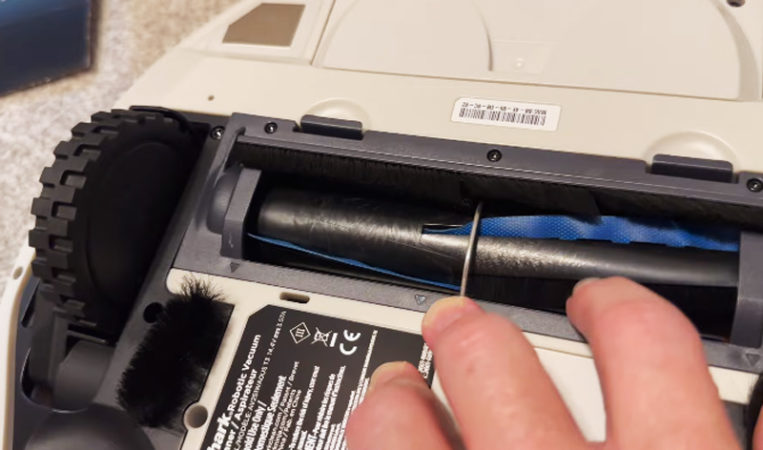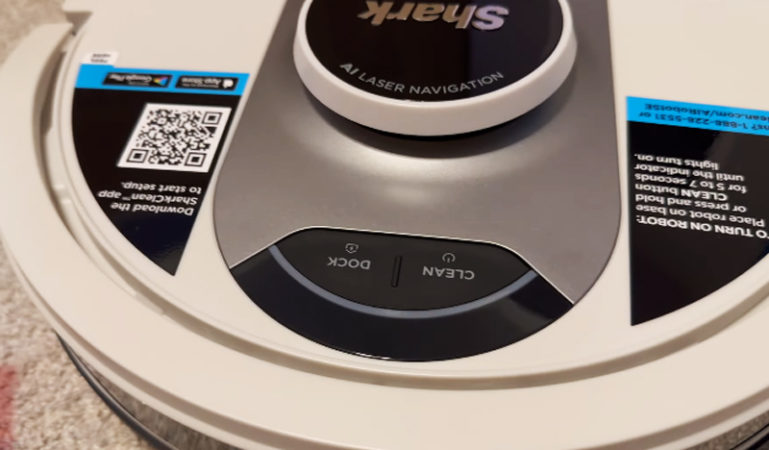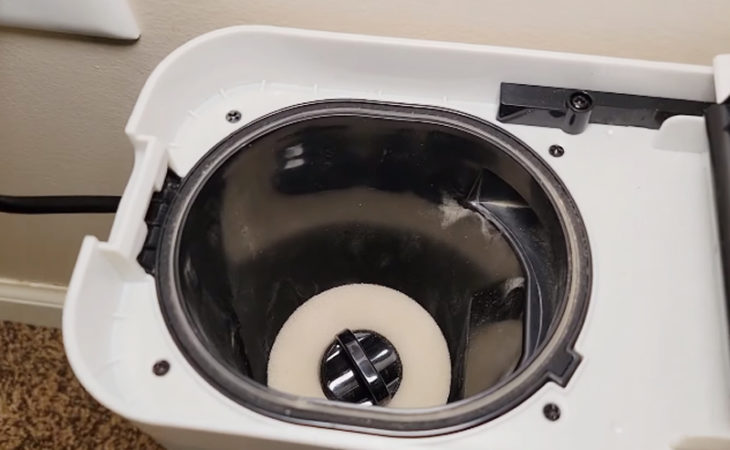I believe many people visiting here might have a common question regarding the difference between the Shark AV2501S vs Shark AV2511AE. If so, I would like to share my opinions and comments on these two robotic vacuums in the article below.
I appreciate their cleaning ability, especially when it comes to hard and medium-pile floors. One of the biggest advantages of these machines is their self-emptying base and HEPA filter. Once you start them, they can handle almost all of your cleaning tasks, from vacuuming to taking out the trash and even charging the battery. Overall, I appreciate their efficiency and convenience.
So, what are the distinguishing differences between them? Firstly, there is a slight variation in the design of the top of each machine. Additionally, the self-empty base is available in different color and capacity options. The Shark AV2501S offers 30-day and 45-day capacity models in black, while the Shark AV2511AE comes in a black 45-day capacity model and a white 60-day capacity model.
Shark AV2501S vs Shark AV2511AE: Comparison Chart




Shark AV2501S vs Shark AV2511AE: Review & Comparison
Cleaning Performance
Compatible floor types
The self-cleaning brushroll is one of the most impressive features of these robots. It performs exceptionally well at collecting pet hair and a wide range of debris, resulting in a thorough cleaning on both hard floors and medium-pile carpets. These robots are versatile enough to handle fine particles like sand and larger items like cereal and Froot Loops with ease.
These robots work great on hard floors and medium-pile carpets but may not be as effective on high-pile carpets and shaggy rugs. The nature of high-pile and shaggy surfaces can present challenges for many robotic vacuums, and these Shark models are no exception.
Another factor contributing to their cleaning performance is their above-average airflow compared to other robotic vacuums I have reviewed. This enhanced airflow allows them to do a commendable job cleaning crevices and edges, ensuring that hard-to-reach areas are not neglected during the cleaning process.

Additionally, the inclusion of two side brushes is a practical advantage, especially when it comes to collecting dirt along the edges of walls and furniture.
Pet hair performance
The pet hair-cleaning performance of the Shark AV2501S and AV2511AE robot vacuums is a notable feature that can be a game-changer for pet owners. While these robotic vacuums may not entirely replace upright vacuums specifically designed for pet hair removal, they certainly play a valuable role in helping to manage pet hair effectively, especially on hard floors.
Their roll brush design, featuring PowerFins technology, is a significant improvement in preventing hair wrap and enhancing dirt pick-up. This design innovation minimizes the frustration of dealing with tangled hair on the brush roll. However, if you have longer hair, periodic hair removal from the brush roll may be necessary. Fortunately, cleaning the brush roll is straightforward, ensuring that maintenance remains hassle-free.
Design & Usability
Build quality
In general, both of these robots exhibit impressive build quality. They boast a robust construction with a body crafted from high-quality hard plastic, not only lending them a sleek and upscale appearance but also ensuring their durability and strength. The main brushroll, thoughtfully designed to prevent the accumulation of hair and debris, not only enhances cleaning performance but also prolongs its operational lifespan.
Assembling the product right after unboxing it is a breeze, thanks to its user-friendly design. Attaching the two side brushes and connecting the docking station is a straightforward and hassle-free task. The setup process has clear and concise instructions, making it accessible for users of all technical levels. Even if you’re not tech-savvy, you can quickly and effortlessly set it up.
Dimensions and weight
In terms of their size and weight, both the Shark AV2501S and AV2511AE robot vacuums have been designed with practicality and efficiency in mind. They share identical dimensions, measuring 12.6 inches in width (W) and 3.5 inches in height (H). These dimensions are consistent with the typical size of many robotic vacuums available on the market, allowing them to effortlessly navigate through different living spaces.
At a weight of 6.7 pounds, both the Shark AV2501S and AV2511AE robot vacuums fall within the average range for robotic vacuums. This moderate weight ensures that these robots are easily manageable and portable. But, since these robots are self-propelled, their weight is not a big concern for me.
Regarding their self-empty base dimensions, both of them come with two options, each offering different capacities. Each offers different capacities. The Shark AV2501S provides a choice between a self-empty base with a 30-day capacity and one with a 45-day capacity. Meanwhile, the Shark AV2511AE presents options for a self-empty base with a 45-day capacity or a larger self-empty base with a 60-day capacity. The bigger the cleaning base is, the larger the storage space is.
Battery and charging
These two robot vacuums utilize Li-ion batteries for power, with up to 120 minutes of battery life. This number is fairly decent compared to other robots I have reviewed before. However, the actual runtime still depends on many other factors, such as the cleaning mode, the cleaning condition, and the battery condition over time.
These robot vacuums require approximately 6 hours to reach full charge from a completely empty battery. It seems to be a pretty long time, but since both of them have the “Recharge and Resume” feature, I suppose that their battery life and recharge time are not a big deal.
Regarding the “Recharge and Resume” feature, this means these robots are designed to autonomously return to their charging dock when their battery level becomes low or when they complete a cleaning cycle. Once the robot docks and recharges, it can then continue its cleaning job from where it left off.
Noise level
Like other vacuum cleaners, these robot vacuums still make noise, but in general, the sounds are much quieter than those of traditional vacuum cleaners. Their noise level is around 60 decibels. It is comparable to the sound of a normal conversation.
I tested them at night and they ran quite smoothly. You can comfortably watch TV in the living room while the cleaning machine is in the next room without fear of being overwhelmed by the sound emitted by the robot.
Navigation and obstacle avoidance
The Shark AV2501S and Shark AV2511AE robot vacuums rely on a navigation system that uses LiDAR technology, which enables these robots to effectively navigate and detect obstacles within their cleaning environments. This technology helps the machines map my 1500 square feet floor in less than 30 minutes.
These robots excel at avoiding obstacles and efficiently maneuvering around various objects, including furniture legs of different shapes and sizes. However, with curved legs, such as those found on kitchen tables, the robots may face challenges in determining the optimal maneuvering path.
However, I noticed that these machines can’t detect any objects with a height of less than 2.5 inches, such as dog toys, socks, or phone charging cables. Anything above 2.5 inches is not a big deal, and these robots can recognize these things easily.
Control
You can control these robot vacuums through both physical touches and Shark’s app.
For physical control, these robots are equipped with two physical buttons located on the top surface. One button initiates a cleaning cycle, while the other sends the robot back to its docking station. Accompanied by illuminated icons that provide visual status feedback, these buttons offer a straightforward means of directly managing cleaning operations on the robot itself.

Meanwhile, the app allows you to name and label specific rooms or areas in your home, giving you the flexibility to control the robot’s cleaning routes with precision. This way, you can specify which areas the robot should clean or avoid during each cleaning cycle. Additionally, the app lets you create weekly cleaning schedules so you can define when and where the robot should operate. You can also fine-tune the cleaning intensity and power settings according to your preference.
However, in my experience, after creating a map using the app, the walls may not appear on the map. This can lead to confusion as you won’t be able to determine where one room ends and another begins. While it is possible to label your own rooms, the lack of walls can make it challenging to navigate. Furthermore, when attempting to choose which rooms you want to clean, the robot may become confused due to incorrect room boundaries.
Cleaning & Maintenance
The Shark AV2501S offers two options for its self-empty base: one with a 30-day capacity and another with a 45-day capacity. On the other hand, the Shark AV2511AE provides two self-empty base choices as well: a 45-day capacity and an impressive 60-day capacity. This versatility allows users to select the self-empty base that best suits their needs, depending on factors like the size of their home and how frequently they want to empty the bin.
One standout advantage of these self-emptying bases is their design, making the emptying process incredibly convenient. What’s even more convenient is that these bins don’t require dirtbags, eliminating any extra costs associated with bag replacements.

Additionally, both the Shark AV2501S and AV2511AE robot vacuums are equipped with true HEPA filtration. This filtration system is highly effective, capturing and trapping up to 99.97% of dust and allergens, even those as small as 0.3 microns. This level of filtration ensures that the air in your home is not only clean but also allergen-free, making it especially beneficial for those with allergies or respiratory sensitivities.
Quick Rundown Of Shark AV2501S
- INCREDIBLE SUCTION: Powerful Shark suction picks up dirt and debris on all floor types—tackling even the toughest of messes in your home.
- NO SPOTS MISSED: With Matrix Clean Navigation, the vacuum cleans in a precise matrix grid taking multiple passes over dirt and debris for whole home, deep cleaning coverage.
- IT EMPTIES ITSELF: The bagless, self-emptying base holds up to 30 days of dirt and debris while its true HEPA filtration captures and traps 99.97%* of dust and allergens (*down to .3 microns).
- PRECISION HOME MAPPING: 360° LiDAR vision quickly and accurately maps your home so your robot can methodically clean detecting and avoiding objects in its path, day or night, adapting to everyday changes in the home.
- PERFECT FOR HOMES WITH PETS: With powerful vacuum suction, Shark’s self-cleaning brushroll, and HEPA filtration system the robot captures pet hair, dust, dander and allergens with ease.
Quick Rundown Of Shark AV2511AE
- INCREDIBLE SUCTION: Powerful Shark suction picks up dirt and debris on all floor types—tackling even the toughest of messes in your home.SharkClean App & Voice Control
- NO SPOTS MISSED: With Matrix Clean, the robotic vacuum cleans in a precision matrix grid taking multiple passes over dirt and debris for whole home, deep cleaning coverage.
- IT EMPTIES ITSELF: The bagless, self-emptying base holds up to 60 days of dirt and debris. The bagless base does not require any additional purchase of disposal bags like traditional auto empty robots.
- SELF-CLEANING BRUSHROLL: Digs deep into carpets and directly engages hardwood floors pulling up debris, hair, and dirt from all surfaces in your home – engineered to pick up more hair and is anti-hair wrap.
- PRECISION HOME MAPPING: 360° LiDAR vision quickly and accurately maps your home so your robot can methodically clean detecting and avoiding objects in its path, day or night, adapting to everyday changes in the home.
Product Videos
Related Articles to Shark Rv2502ae
Related Articles to Shark Av2511ae
References:

Richard B. Schmidt is a prominent figure in the vacuum cleaner industry, boasting over 15 years of expertise. Armed with a Robotics Engineering degree from Northeastern University and a Master’s in Consumer Science from Harvard, his unique blend of technical knowledge and consumer insights positions him as a sought-after authority in vacuum cleaner evaluation. Richard’s career began at Dyson, where he contributed to the development of innovative vacuum models. Transitioning to advocacy and reviews, he co-founded the first Vacuum-focused blog in 2008, offering comprehensive analysis and user guides for various vacuum cleaners. In 2020, he founded RoboMop.net, providing ongoing insights through columns and buyer’s guides.
